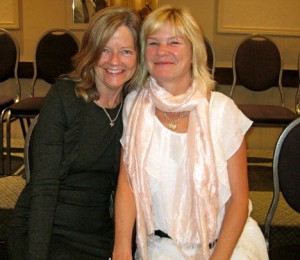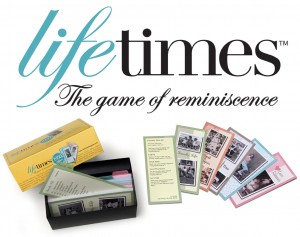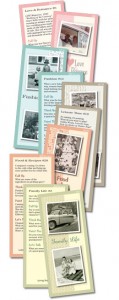
Carol and Mary Jane McPhee, creators of LifeTimes
Sisters Carol and Mary Jane McPhee had no idea a year and a half ago that something big would develop out of a technique they stumbled on to communicate with — and bring some light to the days of — their aging mother.
“It’s all about storytelling and conversations,” Carol says of the game the entrepreneurial siblings from Toronto’s Beach neighbourhood created and now market as LifeTimes: The Game of Reminiscence.
The seed for LifeTimes was planted in the summer of 2010, when Carol and Mary Jane found themselves struggling to find a way to relate to their mother. Shirley McPhee, 86, was living alone in an assisted-living facility and facing short-term memory loss. She was often frustrated, anxious and grumpy, making family visits stressful.
Yet when a family member planned to visit North Bay, where Shirley grew up, she was able to recall exact directions to her childhood home — someplace she hadn’t been in seventy years.
“Cross the railway tracks,” she said. “Go for two blocks. Turn left up the laneway. Look for the little red brick house tucked in among the lilac bushes.”
The sisters were amazed at the accuracy of their mother’s recall when the right question was asked. This “unlocked the door to Mom’s sweet, early memories in that house,” they wrote in a blog post. They saw their mother “relax, light up, become animated . . .”
“We saw a transformation in her,” says Carol. That day the sisters also found out things about each other they hadn’t known, and “my mother was killing herself laughing.”
Later, calling from home, Mary Jane said to Carol, “We cracked something wide open.”
This experience in turn changed the way they communicated with their mom. They began using vintage photographs and music from “her era,” the 1950s, to encourage her memory and storytelling. And through their mother’s stories, they were able to collect a rich and detailed family history.
 For some, this sharing within the family would have been enough. But not for Carol and Mary Jane. Both in their fifties, they retired from teaching the following spring and were looking for something creative to do with their skills and time.
For some, this sharing within the family would have been enough. But not for Carol and Mary Jane. Both in their fifties, they retired from teaching the following spring and were looking for something creative to do with their skills and time.
They’d always been “people with ideas, and three years later we’d see someone else had done them,” says Mary Jane. “We were raising kids and had no time or energy to follow through.”
The idea of developing a game, one that would help others with aging relatives, blossomed over the next few months. The sisters began meeting in each other’s basements and local cafes, and had fun bouncing ideas off their husbands, other family members and friends. Gradually they came up with what they call the game’s “core values” and framework.
At first their research aimed to gather 1950s fact- and current-events-related prompts a la Trivial Pursuit, but over many rewrites a very different game emerged.
“It took a while to break free and write prompts that were evocative and to do with personal life,” says Mary Jane, adding that some, like “Have you ever stolen anything?” really get people talking.
The McPhees collaborated with graphic designer Gord Adams to come up with a prototype game using photographs — many from their own family — and a soft colour palette. LifeTimes comprises 125 conversation cards containing 500 memory prompts, and categories include Love & Romance, Food & Recipes, Fashion, Leisure Time and Family Life. Four types of questions on each card generate a variety of responses.
Their learning curve was steep, says Mary Jane. Only three months after they first seriously discussed the game concept, they were scrambling to finish the prototype and get a website up in time to exhibit at the Ontario Gerontology Association Annual Conference. There, they were encouraged by attendees’ responses, which indicated a need among families, caregivers and health care providers for a game like theirs.
Six months later, 80 percent of their sales are in health care, and the game is used in many seniors facilities in Ontario as well as by the Alzheimer Society. “It’s great for brain fitness,” says Carol.
 An interest among writing instructors is one the sisters hadn’t anticipated, and they’re delighted the game has broader applications.
An interest among writing instructors is one the sisters hadn’t anticipated, and they’re delighted the game has broader applications.
Children’s author Marthe Jocelyn, who runs writing workshops in schools and sometimes uses LifeTimes, says, “I realized that the format of the game cards — a single factual idea leading to a memory prompt leading to a whole chunk of reminiscence — is very much the way a writer develops a story…. The simplest prompt can lead to the richest recollections, allowing the writer to rely … on his/her own experience to fuel stories.”
She finds prompts about “firsts,” such as first cigarette smoked, first kiss, first time away from home, to be particularly evocative. Her workshop participants have also had fun with the LifeTimes card that asks a player to recall the “bad boy” in high school.
Sales before Christmas weren’t quite what Carol and Mary Jane had hoped, but seem to have picked up in the new year. And in a promising development, the sisters recently received a substantial grant from the Canadian Media Fund to produce an app version of the game.
LifeTimes now shares an office with Miso, a workspace for Web and game developers located in the Trinity-Bellwoods area.
“When we play LifeTimes at home,” Carol confesses, “we often don’t get beyond one card” — showing just how much conversation four simple questions can generate. “Every family has its stories, its mythologies. The game provokes a deeper discussion.”
Click LifeTimes to learn more, or to order the game.
Sounds like an incredible game and a must-have for every senior center and struggling writer. Love seeing homegrown ideas like this come to fruition.
Thank you Brock! That’s our goal. Having witnessed it’s positive effects over and over again we too hope to see it in the hands of all those who work first hand with seniors and their families. Every senior out there has a story to share.
This is an amazing story of women bringing an idea to reality. I like the idea of the game. When I used to visit my father’s retirement home, I felt the residents were under stimulated, unless speaking about their early lives. Great idea to focus the concept on the game.
This game has promise across ages and cultures. It seems to be the beginning of a intergenerational series! Bravo to these two innovative sisters!